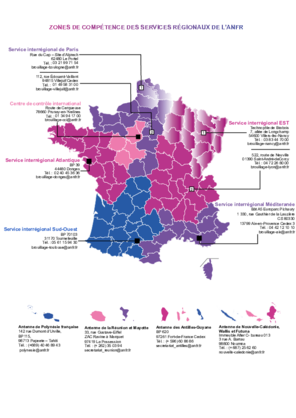A full fledged technical investigation that is triggered by a complaint.
ANFR takes action when victims report interference using a form specific to the type of complainant:
- A request for an interference investigation in the case of interference impacting a radio station belonging to an assigning authority, the user of a professional mobile network (PMR) or of the amateur radio service. This form can be submitted to the National Centralising Bureau (NCB) if the impacted frequency has been declared to the National Frequency File and, for the Amateur radio service, if the station and frequency bands have been declared.
This form should also be filled out by professionals in the event of proven interference of DTT satellite service reception by microwave radio systems in the 10.7-11.7 GHz band; - A request for action if the interference impacts a station on a network open to the public such as a mobile operator network using frequencies authorised by ARCEP (AUF).
- A request for an interference investigation, if the interference impacts low-power, short-range radio equipment of which the frequencies, as indicated in appendix 7 of the national frequency band assignment table, are generally so-called "free" frequencies, i.e. not requiring individual authorisations, but nevertheless subject to general authorisation and compliance with technical conditions designed to avoid any harmuful interference;
- A GNSS (GPS, Galileo, Glonass, etc.) interference report for victims who are not assigned these frequencies (GNSS frequencies are assigned to Civil aviation directorate, Ministry of Army and CNES);
- An express request from a neighbouring country using an AP10 file "Report of harmful interference”.
All other cases can be reported using the "Contact" link on the ANFR website www.anfr.fr, such as the use of a jammer affecting GNSS (Galileo, GPS) mobile telephony and/or WiFi or the unauthorized use of amobile tejephony repeater on a specific site.
Interference reported by frequency assignment bodies
Designated entities can submit their requests to one of the following ANFR departments:
- ANFR’s National Centralising Bureau (NCB);
- the interregional service (SIR) when the location of the impacted equipment is in it’s intervention area (in French overseas territories, ANFR's local branches are the entry points);
- the International Control Centre (ICC), when the impacted equipment is in its intervention area or when it is a question of international interference in the HF band;
Before filling in the request form, the user impacted by the disruption must make sure its own equipment is not the cause. He will provide the Agency the results of all the measurements and analyses he has carried out on the site impacted by the interference.
It should be noted that, apart from requests for action for the general authorisation frequencies known as "free" frequencies (i.e. WIFI, RFID, …) , or for GNSS interference reports impacting entities that are not assigned those frequencies, the impacted station must have been authorised by the Agency and its frequency duly assigned for the request for action to be taken into account. However, when defence, security or navigation services are involved, the admissibility is immediate, bearing in mind that, if necessary, compliance may be requested.
The treatment of a reported interference case is carried out in the field by ANFR agentsequipped with sophisticated equipment to search for, identify, and locate the origin of the interference.
In certain situations, a detection system is installed at a relevant site for the time required to characterise the interference.
Once the equipment and the person causing the interference have been identified, ANFR enjoins to stop the interference.
ANFR can issue a warrant for infringement and forward it to the Public Prosecutor if it wishes the case to be prosecuted.
If necessary, ANFR officers can call on the support of a police officer to assist them in their investigations, for example to have illegal radio equipment or jammers seized.
With the authorisation of the President of the relevant courts, officers may also carry out seizures themselves.


